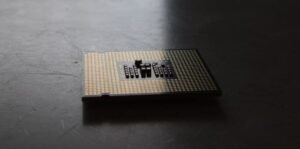AI or IA
Rapid advancements in technology have transformed the way we live and work. One particular area of technological progress that has gained significant attention is artificial intelligence (AI) and intelligent automation (IA). While these terms are often used interchangeably, there are important distinctions that set them apart.
Key Takeaways
- AI stands for artificial intelligence, while IA stands for intelligent automation.
- AI refers to the development of machines that can perform tasks that typically require human intelligence, such as learning, problem-solving, and decision-making.
- IA, on the other hand, focuses on automating repetitive or routine tasks using intelligent systems.
- AI involves creating machines that can think and understand, while IA involves creating machines that can execute commands and tasks.
The Difference Between AI and IA
Artificial intelligence (AI) involves the development of machines capable of performing tasks that typically require human intelligence. This includes learning from experience, recognizing patterns, making decisions, and solving problems. **AI enables machines to simulate human-like cognitive abilities** and has applications in various fields such as healthcare, finance, and transportation.
Intelligent automation (IA), on the other hand, focuses on automating repetitive or routine tasks using intelligent systems. IA uses technologies like machine learning, natural language processing, and robotic process automation to streamline business processes and improve efficiency. **IA helps organizations automate manual tasks and reduce human error**.
The main difference between AI and IA lies in their goals and capabilities. AI aims to create machines that can think and understand complex concepts like humans do. On the other hand, IA focuses on creating machines that can execute commands and tasks efficiently. **While AI emphasizes cognition, IA emphasizes execution**.
AI and IA in Real-World Applications
AI and IA have seen significant adoption in various industries. Let’s explore some concrete examples:
| Industry | AI Applications | IA Applications |
|---|---|---|
| Healthcare | Disease diagnosis, drug discovery, personalized medicine | Automated data entry, scheduling, claims processing |
| Finance | Algorithmic trading, fraud detection, risk assessment | Invoice processing, financial report generation, compliance checks |
AI and IA technologies have also found applications in transportation, customer service, manufacturing, and many other sectors. **These technologies are revolutionizing diverse industries and shaping the future of work**.
The Future of AI and IA
The field of AI and IA is rapidly evolving and holds immense potential for the future. As technology continues to advance, the capabilities of AI and IA systems will expand, opening up new possibilities for automation and intelligence. **From self-driving cars to virtual assistants, AI and IA will continue to transform our day-to-day lives**.
However, it is important to consider the ethical implications and challenges associated with AI and IA. Issues such as data privacy, algorithmic bias, and job displacement need to be addressed to ensure responsible and inclusive technological development. **Balancing innovation with ethics will be crucial in shaping the future of AI and IA**.
In conclusion, AI and IA are both transformative technologies that are reshaping industries across the globe. While AI focuses on creating machines that can think and understand, IA centers around automating repetitive tasks. **These technologies are driving innovation and efficiency, changing the way we work and live in the modern world**.

Common Misconceptions
Misconception 1: AI will replace human jobs completely
One common misconception about AI is that it will completely replace human jobs, leading to mass unemployment. However, this is not entirely true. While AI has the potential to automate certain tasks and jobs, it is more likely to augment human capabilities, rather than replace them entirely.
- AI can assist in automating repetitive tasks, allowing humans to focus on more complex and creative work.
- AI can enhance productivity and efficiency, leading to job growth in new industries and roles.
- AI technology requires human intervention for programming, maintenance, and supervision, thus creating a demand for skilled professionals in the field.
Misconception 2: AI has human-like intelligence and consciousness
Another misconception is that AI possesses human-like intelligence and consciousness. In reality, AI systems, as advanced as they may be, lack true consciousness and understanding. AI is designed to process data, recognize patterns, and perform specific tasks based on algorithms and programming.
- AI systems do not possess emotions, self-awareness, or consciousness like humans do.
- AI operates on data-driven decision-making rather than subjective emotions or intuition.
- AI does not possess the ability to reason or understand complex contexts outside of its programmed domain.
Misconception 3: AI is infallible and always unbiased
There is a widespread misconception that AI is infallible and always unbiased. However, AI systems are built by humans and can inherit their biases and limitations. Bias can creep into AI algorithms through the data used for training or through the biases of the developers themselves, leading to unintended discriminatory outcomes.
- AI algorithms can perpetuate existing biases present in training data.
- AI systems are only as reliable as the data they are trained on and the quality of their programming.
- AI can make mistakes and produce biased results, requiring regular monitoring and evaluation to ensure fairness and accuracy.
Misconception 4: All AI is similar to fictional representations
Many people’s perception of AI is shaped by fictional representations in movies and literature. However, it is important to note that not all AI is like the human-like intelligent agents portrayed in fictional works. AI can have various forms and functions, ranging from machine learning algorithms that analyze data to robotic systems that perform physical tasks.
- AI encompasses a wide range of technologies and applications, including natural language processing, image recognition, and recommendation systems.
- AI can be found in everyday tools and services, such as virtual assistants, recommendation engines, and spam filters.
- AI can exist as software-based systems running on servers, rather than physical robots or androids.
Misconception 5: AI will surpass human intelligence and take over the world
There is a popular belief that AI will eventually surpass human intelligence and take over the world, leading to dystopian scenarios. However, this is a speculative notion that is not supported by current scientific understanding of AI. While AI can perform specific tasks better than humans in certain domains, it lacks the broader cognitive abilities and adaptability that humans possess.
- AI systems are designed with specific objectives and capabilities and are limited to what they are programmed for.
- AI lacks human traits such as creativity, empathy, and moral reasoning, which are crucial for complex decision-making and problem-solving.
- Human oversight and ethical frameworks are essential in guiding and governing the development and use of AI.

Artificial intelligence (AI) and intelligent automation (IA) are two cutting-edge technologies that are transforming various fields, including healthcare, finance, transportation, and entertainment. AI refers to the development of computer systems that can perform tasks that would typically require human intelligence, such as problem-solving, learning, and decision-making. On the other hand, IA focuses on automating repetitive and mundane tasks using intelligent software. In this article, we will explore 10 fascinating aspects of AI and IA, showcasing their impact and applications.
1. Enhancing Cybersecurity:
AI and IA play a crucial role in strengthening cybersecurity measures. With the increasing complexity of cyber threats and attacks, intelligent systems can quickly detect and respond to suspicious activities. These technologies ensure robust protection for sensitive data, networks, and systems.
2. Revolutionizing Healthcare:
In the realm of healthcare, AI and IA have revolutionized diagnostics, treatment development, and patient care. Intelligent algorithms can analyze massive amounts of medical data, aiding in the early detection of diseases and suggesting personalized treatment plans. Additionally, IA streamlines administrative tasks, allowing healthcare professionals to focus more on patient care.
3. Optimizing Transportation:
AI-powered systems are transforming the transportation industry by improving traffic management, route optimization, and vehicle automation. These technologies enable efficient navigation, reduce congestion, and enhance passenger safety, offering a more sustainable and comfortable travel experience.
4. Enabling Virtual Assistants:
Virtual assistants, such as Siri, Alexa, or Google Assistant, are becoming integral parts of our daily lives. These AI-driven programs use natural language processing and machine learning algorithms to understand user commands and provide personalized responses, making tasks like searching the internet or setting reminders effortless.
5. Personalized Online Shopping:
IA empowers e-commerce platforms to offer personalized product recommendations and tailored shopping experiences. By analyzing user behavior and preferences, intelligent systems present customers with relevant products, improving both customer satisfaction and sales.
6. Transforming Finance:
The finance industry benefits greatly from AI and IA. Intelligent algorithms can analyze vast amounts of financial data, spotting patterns and predicting market movements. They assist in fraud detection, risk assessment, and automate certain financial processes, resulting in more accurate and efficient operations.
7. Innovating Entertainment:
AI and IA have revolutionized the entertainment industry, enabling realistic virtual simulations and immersive experiences. Intelligent algorithms can analyze massive data sets, recommending tailored content, such as movies, music, or even video games, based on individual preferences.
8. Personal Health Monitoring:
Wearable devices equipped with AI capabilities enable individuals to monitor their health in real-time, measuring vital signs, physical activity, and sleep patterns. These devices can alert users about potential health risks and help them make informed decisions regarding their well-being.
9. Enhancing Customer Service:
AI-powered chatbots and automated customer service systems streamline support processes, improving response times and customer satisfaction. These technologies can handle a vast number of customer queries simultaneously, addressing their concerns promptly and efficiently.
10. Augmenting Education:
AI and IA provide new opportunities for personalized and interactive education. Intelligent systems assist in adaptive learning, tailoring educational content to individual students’ needs. Virtual classrooms, language learning applications, and automated grading systems are just a few examples of their impact on education.
In conclusion, AI and IA have revolutionized various aspects of our lives, from healthcare to entertainment, finance to transportation. These technologies continue to evolve rapidly, presenting endless possibilities for improvement and innovation in multiple industries. As we embrace their potential, it is crucial to ensure ethical and responsible use, leveraging AI and IA to enhance our lives and create a brighter future.
Frequently Asked Questions
AI or IA
What is artificial intelligence (AI)?
What are the key components of AI?
AI consists of various components such as machine learning, natural language processing, computer vision, and expert systems. These components work together to enable machines to simulate human intelligence.
What are some real-world applications of AI?
AI is used in various fields, including healthcare, autonomous vehicles, finance, customer service, and cybersecurity. It helps in improving efficiency, accuracy, and decision-making processes.
What is intelligent automation (IA)?
How is IA different from AI?
Intelligent automation refers to the integration of AI technologies and robotic process automation (RPA). While AI focuses on simulating human intelligence, IA combines AI with automation to enhance business processes and tasks.
What are the benefits of IA?
IA can streamline and automate repetitive tasks, improve accuracy, increase productivity, reduce operational costs, and free up human resources for more complex and creative work. It also enables organizations to make data-driven decisions.
How is AI transforming industries?
What role does AI play in healthcare?
AI is revolutionizing healthcare by improving diagnostics, personalized medicine, drug discovery, virtual assistants, and patient care. It helps in detecting diseases at early stages and assists doctors in making accurate diagnoses.
How is AI impacting the finance industry?
AI is used in finance for fraud detection, risk assessment, algorithmic trading, customer service, and personalized financial recommendations. It enables financial institutions to analyze vast amounts of data quickly and make informed decisions.
What are the ethical concerns surrounding AI and IA?
What are the potential risks of AI?
AI can pose risks such as job displacement, privacy breaches, bias in decision-making algorithms, and potential misuse of AI-powered technologies. It is essential to establish ethical guidelines and responsible AI practices to mitigate these risks.
How can ethical concerns be addressed in AI and IA?
Ethical concerns can be addressed by designing AI and IA systems that are transparent, fair, and accountable. This involves ensuring unbiased data, rigorous testing and validation, and establishing regulations and policies to govern AI technologies.




